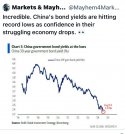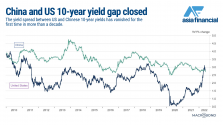This and the 50 year bond yield really blow my mind. I remember this is what happened for much of early 2010s to UST.
Absolute stupidity in trying to force a China collapse narrative:

Bond yields go UP when there is lack of confidence because the government needs to increase interest to attract buyers.
Yields go DOWN when there is confidence in the country and the government can sell bonds at will.
Bond yields going down means the cost of government borrowing is low.
Yes, this is something that is usually accorded to a safe-haven. Not saying China is a safe-haven but it is unlike any other Emerging Market.
Chinese LT bonds can now attract buyers with little interest unlike in the past -- where like all EM economies, it needed to pay far more than the US to find buyers.

